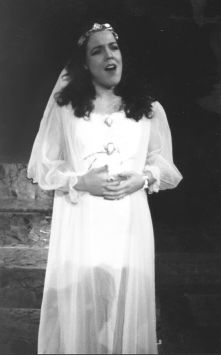
The School of Church Music at Southern Seminary scored a triumph in presenting only the fifth American production of Jules Massenet's grand opera, Herodias. It was grand, indeed, and in every way.
This particular production was the world premiere for the work in English, deftly translated by faculty member and producing director Mozelle Clark Sherman. Though its libretto draws considerably from Scripture, it is theater and not an oratorio. The prime source is Gustave Flaubert's novel.

Clark also retained some of the original French. The elegant costumes were carefully designed to resemble those used in the first performance back in 1881.
The use of English subtitles let many in the audience follow the story line rather well. The use of the words "many" and "rather" refers to the location of the subtitles on the left side of the auditorium and, perhaps, the readability (type size) on both sides for people 12-15 rows from the rear.
Though its libretto draws considerably from Scripture, it is theater and not an oratorio. The prime source is Gustave Flaubert's novel.
The amount of time, talent, energy and just plain hard work that went into two performances was staggering. Dr. Lloyd Mims wielded his baton over all, including an impressive 68-piece orchestra, with admirable poise and skill. The location of the orchestra where it could be heard but not seen was a masterstroke.
The casting and vocal talents were sheer joy. Douglas Crawley, Gregory Church, Branita Holbrook Adams and Joseph Wilkinson were more than up to their demanding roles as Herod Antipas, John, Salome and Phanuel respectfully.
It was truly remarkable that so much action could be expressed in such relatively small space. The score was fascinating, more than usually creative and beautiful and if one listened closely, one might feel one was in the middle East. Would that space could permit recognition of each member of a well chosen and trained cast.
The expression "a thing of beauty is a joy forever" applies to this performance, as it will live in the book of memory of more than a few members of a very appreciative audience.